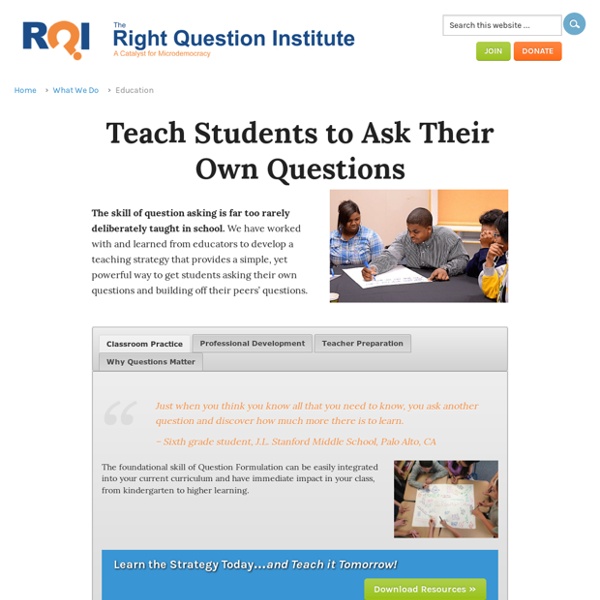Teach Students to Ask Their Own Questions

http://rightquestion.org/education/
Related: My Teaching Resources
• Research
National Critical Zone Observatory
The Critical Zone (CZ) is where rock meets life. It covers Earth’s land surface and spans from the bottom of the water table to the top of the vegetation canopy. Understanding how it works requires an interdisciplinary approach across the physical, chemical, and biological sciences.
Many, Many Examples Of Essential Questions
Many, Many Examples Of Essential Questions by Terry Heick Essential questions are, as Grant Wiggins defined, ‘essential’ in the sense of signaling genuine, important and necessarily-ongoing inquiries.”
Inquiry Charts (I-Charts)
Classroom Strategies Background The Inquiry Chart (I-Chart) is a strategy that enables students to generate meaningful questions about a topic and organize their writing. Students integrate prior knowledge or thoughts about the topic with additional information found in several sources. The I-Chart procedure is organized into three phases: (1) Planning, (2) Interacting, and (3) Integrating/Evaluating. Each phase consists of activities designed to engage students in evaluating a topic.
Using the Exploring Earth Web Site
Using Investigations Investigations can be used at many stages of instruction. They have been employed in whole-group settings, in individual and small group work, as homework or extra-credit assignments, and to launch independent research projects. The investigations serve particularly well as performance assessments because they allow students to apply their understanding and skills to real-world issues or situations. Many of the investigations have mechanisms that provide immediate feedback to student responses. This kind of immediate and concrete input helps guide students' thinking and facilitates the development of their speculations and hypotheses building. Investigations have been judged most effective when students worked on them individually or in pairs.
Conducting Effective Internet Research
There has been a great deal of buzz about research-based writing lately, in no small part because of its emphasis in the Common Core Standards. Indeed, there is an entire strand of the writing standards dedicated to research. From the document English Language arts & Literacy in History/Social Studies, Science, and Technical Subjects (p.18):
Gr 5-8 Research Guide: Introduction and Skills Menu
About the Guided Inquiry research process: There are many different ways to approach research, but research is often easiest if you use a model with specific steps that can be applied to any topic you might choose. For middle school students, Baltimore County Public Schools has selected the Guided Inquiry Research Process Model. It is a highly flexible model that will help guide you through all parts of a research project. Research using Guided Inquiry has eight phases: Open, Immerse, Explore, Identify, Gather, Create, Share, and Evaluate.
Chapters in the EET
Help Results 1 - 10 of 44 matches Analyzing Plate Motion Using EarthScope GPS Data DATA: EarthScope GPS Data. TOOLS: Spreadsheet, Google Maps. SUMMARY: Learn how GPS monuments make precise measurements of Earth's surface. Graph motion data and map velocity vectors to explore tectonic motion and surface deformation in the Pacific Northwest.
Evaluating Sources: The CRAAP Test
The CRAAP Test helps you evaluate sources to determine whether or no they are appropriate for an academic assignment When was the information published or posted? Has the information been revised or updated?
Building Guided Inquiry Teams for 21st-Century Learners
School Library Monthly/Volume XXVI, Number 5/January 2010 Building Guided Inquiry Teams for 21st-Century Learners by Carol C. Kuhlthau and Leslie K.
VALUE Rubric Development Project
The original VALUE initiative in 2007-09 involved teams of faculty and other educational professionals from over 100 higher education institutions engaged over many months to develop 16 VALUE rubrics for the LEAP Essential Learning Outcomes. Each rubric was developed from the most frequently identified characteristics or criteria of learning for each of the 16 learning outcomes. Drafts of each rubric were then tested by faculty with their own students’ work on over 100 college campuses.
Related:



